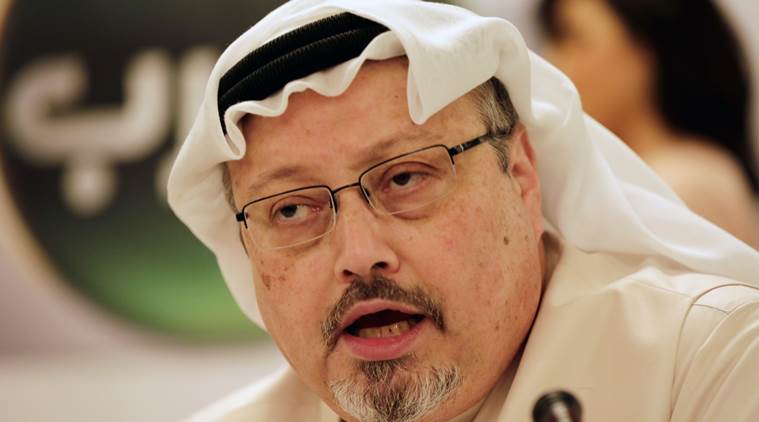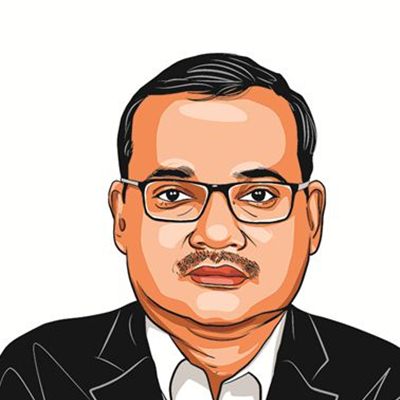War, optics, Khashoggi
Truth is a casualty in the contest of wills in the region.

Saudi journalist Jamal Khashoggi, a columnist for The Washington Post newspaper, who apparently went missing after going to the Saudi Consulate in Istanbul. (AP Photo)
Whatever happened to Jamal Khashoggi, the journalist who went missing from the Saudi consulate in Istanbul on October 2?
Going by the international media’s reporting, Khashoggi was brutally murdered in the diplomatic post by a squad of Saudi hit men who had flown into the Turkish city in swank private jets. The theories, almost all traceable to a drip-drip of calculated leaks by anonymous Turkish government officials and unnamed US intelligence officials, are being floated almost as fast as they can be consumed and shared on social-media platforms.
Trouble is, facts are not being allowed to get in the way of a good story, as is almost always the case with Saudi Arabia, but especially since the rapid rise to power of the 33-year-old crown prince, Mohammed bin Salman, MbS in short, and his clampdown on liberal activists, dissenting Salafi preachers, the religious police and even the official religious establishment.
It may well be that the editors of elite liberal US publications antagonistic towards US President Donald Trump (and, by extension, his perceived foreign allies) are indifferent to the ridiculousness of rolling out heavily one-sided reports and commentaries on a murky event in a country that exercises tight control over its media. More likely, they are doing this because all is fair in love and war.
EXPLAINED | A dissident, a disappearance
Stripped of both the genuine sadness and the political posturing, the Istanbul incident has brought clarity to an ongoing multi-dimensional, intra-Sunni conflict. In their simplest forms, the belligerents are Muslim Brotherhood-aligned Islamists (also known as “opponents of Trump”) and staunch anti-Islamists (also known as “friends of Trump”). And although the body count of this war is nothing like the real thing, the warring sides are all too aware of what exactly is at stake and who is on whose side.
There is little doubt that at 59, Khashoggi would have ideally preferred to ply his profession unmolested and without fear in his home country, Saudi Arabia. But in the real world, the country where he went missing, Turkey, is deeply embroiled in the intra-Sunni conflict, which comprises actual fighting, electronic warfare, chequebook diplomacy and propaganda wars.
By most accounts, Khashoggi was not a disinterested observer of this clash. He made his political position clear in his Washington Post column of August 28 thus: “The US is wrong about the Muslim Brotherhood — and the Arab world is suffering for it.”
Criticising both the Trump and Obama administrations for not stopping the 2013 “coup in Egypt”, he wrote: “They all missed the big picture and were governed by their intolerant hatred for any form of political Islam, a hatred that has destroyed Arabs’ choice for democracy and good governance.”
Evidently, Khashoggi had not hesitated to take sides in an ideological war despite the personal cost and risk. But did he do so out of conviction, or was he driven by the force of circumstances as a self-exiled Arabic-language journalist?
One can make intelligent guesses at best. In his previous jobs, Khashoggi had accommodated voices critical of Saudi Arabia’s Wahhabi religious establishment and strict Islamic rules. And each time, he paid a high price for his decision.
Still, Khashoggi never hid his past: That he was once a part of Osama bin Laden’s circle of associates, having known the al Qaeda chief from his days as a radical Islamist right up to the mid-1990s. Since he moved to Washington, DC in the summer of last year to avoid possible arrest, the soft-spoken Khashoggi began appearing as a guest on the English and Arabic TV stations of Al Jazeera, the Qatar-based media network whose outlets are blocked in the countries comprising the Saud-led bloc.
Khashoggi would openly criticise Saudi policies, making no exception for the touchy topic of the military campaign against the Iran-aligned Shia Houthi rebels in Yemen, going so far as to say MbS “must agree to accept the Islamists in Yemen, and the Houthis in Yemen”.
None of this would have gone unnoticed by the Saudis, who have a distinct disadvantage in an area of increasing importance in the ongoing war of ideas: The lack of sympathetic public intellectuals to match the thrust and parry of critics such as Rami Khouri, Madawi al-Rasheed and Khashoggi, to name just three.
To complicate matters, a convergence of the geopolitical concerns of the Saudi-led bloc and those of the conservative duo, Trump and Israeli leader Benjamin Netanyahu, seems to have put the former squarely in the sights of two media establishments that often see eye to eye, viz. Islamist-backed networks and elite liberal Western newspapers and broadcast networks.
In such a charged environment, for all we know someone at the receiving end may have been tempted to conclude that, well, all is fair in love and war.
Although MbS and his allies are focused for now mostly on aggressively promoting a forward-looking, tolerant version of Islam and combating political Islam’s influence in the Middle East, they surely have no illusions about the potentially transformative impact of their success on the wider Sunni Islamic world in the long run. Small wonder then, they are being challenged by the conservative Islamist camp in every battleground.
The question naturally arises as to how long the costly contest of wills can be sustained. The answer is: Probably for a very long time, given the current high oil prices.
Whether or not Khashoggi has become this war’s most prominent casualty, only time and impartial investigation will tell. But truth does seem to have become a casualty already.
The writer, a Dubai-based independent journalist and columnist, has been a Middle East news editor for more than two decades
For all the latest Opinion News, download Indian Express App
More From Arnab Neil Sengupta
- Perilous road to a sovereign stateFrom Iraq’s Kurd region and Catalonia, the lesson for national determination movements: Costs of pushing for secession are too high...
- Engaging with the enemyAs a first step, though, India needs to devote more resources to examining objectively the ferment in Kashmir, with less blaming Pakistan reflexively every time…








































No hay comentarios:
Publicar un comentario